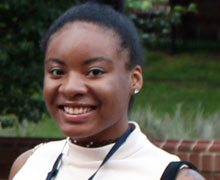Langston, ’18, Makes Tracks with Race4Autism Internship
Related Posts
Connect With Us
August 8, 2016
By Jake Weber

Queana Langston, ’18, is majoring in psychology with a concentration in the Gerald R. Ford Institute for Leadership in Public Policy and Service. She is also a member of the Prentiss M. Brown Honors Program. She is the daughter of Kimberly Langston of Cleveland, Ohio, and a graduate of Cleveland School of Science and Medicine.
“When I first heard that there was a 16-year-old autistic race car driver, I was amazed,” says Queana Langston, ’18, whose recent Ford Institute internship was inspired by the story of driver Armani Williams. “It is so cool to see how he does not allow anything to deter him from what he loves. He is competing against adults, not anyone his own age. His interest started at a young age and is going to take him far.”
Langston first learned about Williams and the Race4Autism Foundation through her uncle, who was hired to shoot a documentary about the nonprofit. “I wanted to work there out of the goodness of my heart,” Langston says, realizing only later that an internship would not only benefit her Albion studies, it would allow her to apply certain skills on behalf of the foundation’s goals.
Langston’s internship was almost exclusively focused on one large project: creating a national network of autism advocacy organizations that would help promote and support the Race4Autism Foundation. Langston did online research to find these organizations, then created a spreadsheet of contact information. The work “took weeks and hours to complete because I found so many organizations throughout the country,” Langston says. In fact, the finished document was organized by state.
Along with gathering contact information, Langston asked whether the organizations would be interested in promoting the Race4Autism film and supporting Williams’ racing career. One of Race4Autism’s missions is to “provide ticket giveaways, so autistic individuals and families can attend track events for free,” Langston says.
Race4Autism’s autism-related network is a critical part of its short- and long-term objectives, as spreading the documentary will inspire those with autism to reach for difficult goals. Even more important, Race4Autism is working to build a network for people who are especially challenged by networking.
“Del Williams, Armani’s father and the founder of Race4Autism, showed me that up to 90 percent of autistic individuals are unemployed,” Langston explains. “He wants to make a difference by creating a network that promotes hiring and references for autistic individuals.”
Langston noted that setting up the database and entering the information was “long work put into staring at the computer for so long. It was not hard at all to research, just very time-consuming.”
The work, however, was also satisfying. “Being passionate about something really does help when doing what you want to do and not because it is asked of you,” Langston says. “I think I am good at trying to see a bigger picture and going after it, just wanting to make a difference.”
Finally, Langston notes Albion’s role in her internship success. “Albion has taught me valuable lessons about myself. I am always trying to take on things, be more helpful, have an open mind, take on responsibilities, multitask—things that may not be just learned in the classroom, but learned at being at Albion in general,” she says.
“The Ford Institute has helped with teaching me about public policy and understanding a little about nonprofits,” Langston adds. “Ford has shown me how volunteering can make you a better person, learning about yourself and others, and the world in general.”